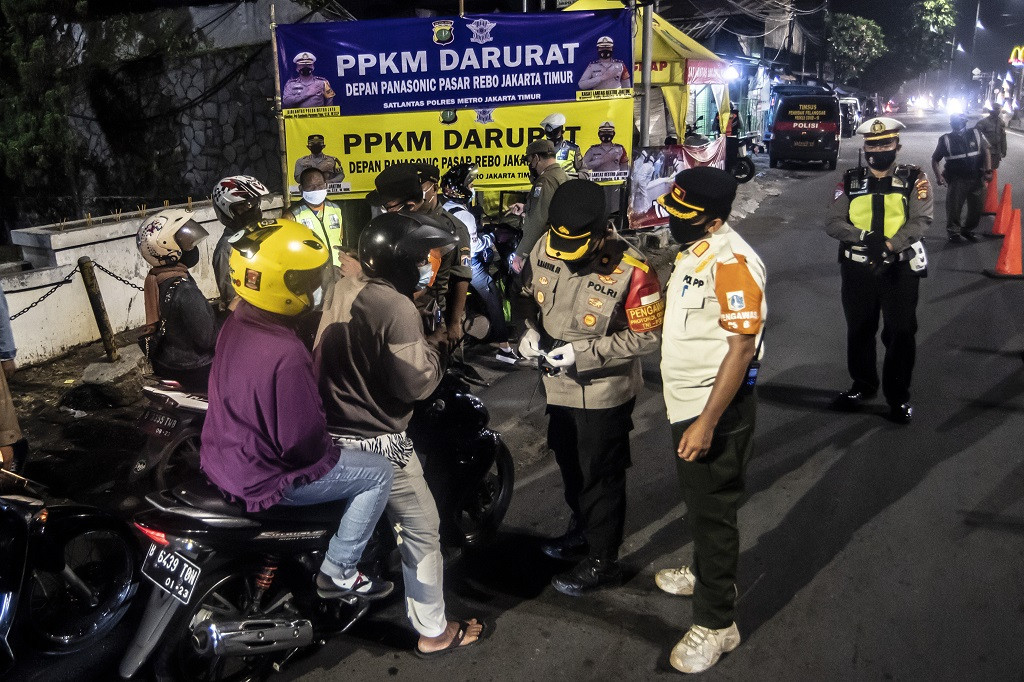Popular Reads
Top Results
Can't find what you're looking for?
View all search resultsPopular Reads
Top Results
Can't find what you're looking for?
View all search resultsGovernment eases restrictions in Greater Jakarta
Under the more relaxed restrictions, places of worship and restaurants are allowed to open at 25 percent capacity, while shopping malls are allowed to operate at 50 percent of their maximum capacity.
Change text size
Gift Premium Articles
to Anyone
P
resident Joko “Jokowi” Widodo announced on Monday that the government was easing COVID-19 curbs in Greater Jakarta, from level 4 -- the strictest in the four-tiered public activity restrictions (PPKM) -- to level 3, for the first time since the policy came into effect in July.
“After seeing improvements in several [pandemic] indicators, we decided to gradually ease public activity restrictions [...],” Jokowi said.
He said PPKM level 3 was in place starting on Tuesday until Aug. 30 in Greater Jakarta, as well as two other urban agglomerations in Java: Greater Bandung in West Java and Greater Surabaya in East Java.
Under the more relaxed restrictions, places of worship and restaurants are allowed to open at 25 percent capacity, while shopping malls are allowed to operate at 50 percent of their maximum capacity.
Export-oriented industries and their supporting sectors are allowed to operate with 100 percent office capacity but must be closed for five days if any COVID-19 case is found on their premises.
Jokowi’s announcement came as a surprise as even though Jakarta has seen a major improvement in its COVID-19 situation, some neighboring cities continue to report high numbers of cases or deaths.
Depok in West Java, for instance, has become one of the country’s hotbeds since early this month, with the city reporting last week 77 new cases per 100,000 people per week, higher than Jakarta, which reported 52 cases per 100,000 people per week.
Bekasi, also in West Java, meanwhile, recorded 34 cases per 100,000 people in the same week. However, its fatality rate increased threefold last week, from 111 to 436 people, higher than Jakarta with 152 weekly deaths.
The high number of cases was partly attributed to low vaccination rates and vaccine disparity in the regions.
The capital has so far administered first shots to around 9.4 million people, slightly over the target of 8.9 million, or around 104 percent. This is far higher than around 15 to 30 percent of the target achieved in the neighboring cities.
[A day before the central government announcement, Jakarta Governor Anies Baswedan said that the central government was previously afraid to relax curbs in Jakarta if cases in the satellite cities "are not 100 percent under control". He was commenting on the previous round of PPKM level 4 in Jakarta.]
Jakarta Deputy Governor Ahmad Riza Patria said on Sunday that Jakarta was considered a "green zone", or a region with the lowest risk of transmission, but he advised residents to remain vigilant.
"Mask-wearing, social distancing and handwashing must remain a necessity," Riza said as reported by kompas.com.
Once the country’s COVID-19 epicenter, Jakarta has been seeing a significant decline in the daily tally for both new cases and deaths since the peak of the second surge of infections in mid-July.
New cases dropped from 14,619 on July 12 -- Jakarta’s all-time high -- to 702 on Sunday, and deaths from 123 to 22.
COVID-19 bed occupancy in Jakarta fell from above 85 percent in mid-July to 39 percent on Sunday.
Riza attributed this improvement to its "rapid vaccine rollout", even going as far as saying the capital “has reached herd immunity, having vaccinated 9.3 million people with the first dose”.
However, since 30 to 40 percent of the people who received the first dose in Jakarta are from out of town, Jakarta has now added 2.2 million more people to the list of targeted recipients, Riza said.
Yet, only 54 percent of Jakarta's initial target population have received the second dose.
Some experts have disputed Riza's herd immunity claim, saying that at least 85 percent of the population have to be fully inoculated to achieve herd immunity from COVID-19. This makes up for the initial target recipients in Jakarta.
Epidemiologist Dicky Budiman recently said that herd immunity was “a pipe dream” for Jakarta considering that no available vaccine was 100 percent effective at protecting against infection, meaning that breakthrough infections and transmission could still happen among fully vaccinated individuals.
Some foreign studies also suggested the Delta variant -- which became the dominant variant in Jakarta during the second surge of infections that devastated the city last month -- had reduced the efficacy of various vaccines.










